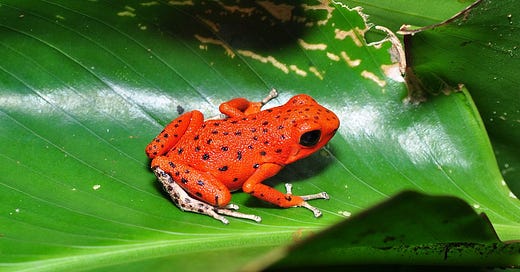Photo: Strawberry Poison Dart frog. Poison dart frogs collect their venom by eating ants and concentrating the poison from ant stingers in their tissues.
Very few ants bite humans; their pincers are generally too small to affect humans. Most of the familiar ants that hurt us, such as fire ants (solenopsis invicta) are ants that sting.
Fire ants are very badass ants.
And what of the poison carried by Yellowjackets?
The word ”poison” did not always means something deadly. It’s directly related to the word from Latin, potio(n), which is in turn derived from potare, to drink. It came to mean a harmful medicinal draught (beverage) by way of middle English, adopted from the French word poison meaning “magic potion.”
The word magic, in turn, means something that confers power. Poison is an external substance, and other words, that confers power, – something we drink that gives us ability, that cures disease, or that somehow makes us stronger. The interesting version of it in modern English into something that can kill us carries with of what hubris is all about. That is to say, we meet our thought as things we drink; we think that it will make us more powerful, magical. Our thought seduces us with the belief that causality is what life is all about; that we can think this, and thereby make that happen. It is the power of magic.
Yet in the morphology of the word through middle English, a recognition emerges that the potions we drink believing they are magical may kill us. And if we take a look at where we are today, the strange little cautionary tale illustrated by the etymology of the word underscores just how dangerous thought can be. Of course, we have always known how dangerous thought is; men have been wielding thoughts against one another as weapons throughout history. Its bad uses often seem to outweigh the good ones.
Keep reading with a 7-day free trial
Subscribe to Zen, Yoga, Gurdjieff: Lee's Gurdjieff Newsletter to keep reading this post and get 7 days of free access to the full post archives.





